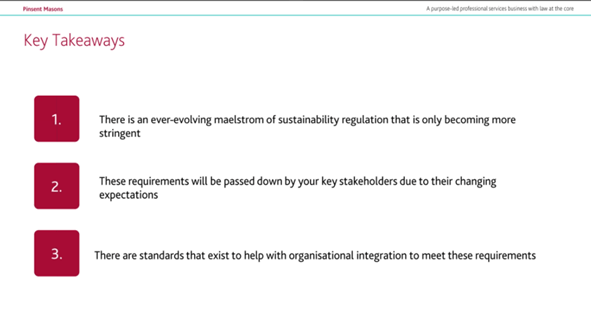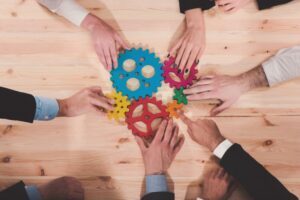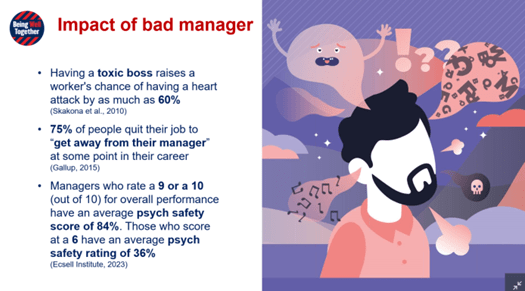The 13th annual British Safety Council (BSC) conference took place virtually this month with a theme of organisational resilience, covering topics including: wellbeing, AI, sustainability, ageism, and diversity in the workforce.
The day began with an opening address from Chief Executive of the BSC, Mike Robinson and then Nathan Baker, Chief Executive of Institute of Occupational Medicine (IOM) hoping delegates gain tangible insights from the event.
Tackle sustainability with small steps

Hayden Morgan, Partner and Head of Sustainable Finance Consultancy at Pinsent Masons
Hayden Morgan, Partner and Head of Sustainable Finance Consultancy and Dominique Goncalves, Sustainable Finance Advisor, both from Pinsent Masons; and Tunde Agoro, Director of ESH at RPS Consulting Group, discussed global development in sustainability and what organisations can do to prepare.
With the UK’s net-zero target due by 2050, Morgan warned that sustainability is global and “it will affect all businesses across all sectors for the next 25 years or so”.
However, he added, it is also an opportunity for businesses to develop new strategies and plans, discount old ones and still meet profit targets.
Agoro continued by saying a hard target for sustainability is good, but that it was important to break this down intro manageable goals: “By setting interim targets and milestones it will not only boost morale, it helps us to identify and to see progress, to know that we are on the right track.”
Agoro added that many businesses may not understand the metrics and terms for sustainability, but are ‘suddenly dropped into’ roles where they need to input or provide responses to investors, yet may not have the understanding to manipulate or use data, which is where part of the challenge lies.
It is something that involves upskilling and training for every department in the business”
He emphasised that it was not one department’s issue: “It is something that involves upskilling and training for every department in the business,” he said. “Sustainability cannot be an add-on or stand-alone unit, it’s got to be embedded across every single functionality, across every department.”
He added that there should still be a central team that manages the overall sustainability input, but put an emphasis on upskilling HR, finance and admin teams.
Dominique Goncalves went on to explain how it was a ‘confusing landscape of sustainability requirements’ where requirements vary across jurisdictions and countries that aren’t always aligned. This in turn, she said, can cause confusion for investors and subsequently for organisations, but that the ‘ever-evolving landscape’ needs to be kept on top of.

A slide from Goncalves’ presentation with key takeaways on sustainability
She told delegates: “Organisations at the forefront of integrating sustainability principles into their operations are likely to be more attractive to these investors, than an organisation who hasn’t done any of this work yet or who hasn’t started to think about these principles in the organisations.
“So, getting ahead of the regulation, rather than waiting to be mandated to drive sustainability in your business can be a way of attracting future finance.”
Further reading: ESG consultants key spend for sector, survey reveals
Multi-generational workplaces

Credit: Alamy Stock
A panel session on diversity and ageism included Morgan Lobb, Chief Executive Officer of VERCIDA, a diversity and inclusion consultancy, who told delegates about initiatives for over 50s entering apprenticeships or returning back into the workforce, adding: “We’re at a point in society right now where we have the most multi-generational workplace that we’ve ever had in the history of working.”
Lobb said: “Younger generations – 44 years and below – are seeking out organisations that have high intentions of building an inclusive environment.
“Employers will need to keep up with the technology to ensure that they are being inclusive and reaching those audiences when they are trying to attract individuals into their workforce.”
He mentioned cross-mentoring (junior employees mentoring more senior employees as well as the other way round) as a great way to have a positive impact in a multi-generational workplace.
Lobb also discussed having general interest groups: “In terms of how we can start to create a more inclusive workplace culture that includes multi-generation, we’re starting to see things like staff network groups, that are not necessarily to do with characteristics such as ethnicity or sexual orientation but things like photography class, for example, which are appealing to lots of generations and help to get people involved in activities where there can feel included…it’s about finding topics in an organisation that have broad appeal.”
Katy Bennett, Diversity, Equity and Inclusion Director at PWC said that the current economic situation means that more people need to stay in work, leading to older generations in the workforce: “There’s research to say that actually some of the most valuable individuals from an organisation are the older populations, these are people who have huge amounts of experience, skill. And if they are supported and…are included, and those skills can be leveraged…there’s a great piece there that can be done to make a company work better, commercially.”
She added also that the role of data is crucial in understanding how different job aspects affect different working groups.
The missing ‘NorthStar’ of wellbeing

Marcus Herbert, Head of Wellbeing at BSC
Next on the agenda was Marcus Herbert, Head of Wellbeing at BSC who argued that the potential ‘NorthStar’ of workplace wellbeing is line managers and their influence on their teams.
Herbert said that different aspects that may affect wellbeing could be how an organisation deals with change management, career development or the perception of autonomy that the employee has.
Along with employee voice, these factors are usually fed through the management structure. These are things, Herbert said, that line managers can influence: “It’s a lot more than just mental health and physical components.”
Herbert added that one of the most common causes of stress in a workplace at the moment is the perception of workload with the second being management style, which, he said, had increased from the third most common to the second between 2021 and 2022: “Clearly at the moment we’re not having enough of an impact on the organisations to help management style not become one of those causes of stress within the workplace.”

A slide from Herbert’s presentation on the impacts of having a bad manager
However, Herbert said that line managers are most at risk of burnout as they are in a tough position, usually being promoted for being a technical expert while struggling to instigate softer skills.
Along with this, line managers are tasked with targets and KPIs, responsibilities to support HR teams with situations to do with welfare and performance management, as well as wider responsibilities such absence from work, and team motivation and morale.
When looking at research, Herbert said, “Managers that are rated at nine out of 10 for their overall performance as a manager, tend to see a psychological safety score of their team members of 84% versus those that score six out of 10, which, at first glance may not seem like a bad score, but they only have a psychological safety rating of 36%.”
Herbert concluded that it impacts teams when managers are well cared for: “Maybe the NorthStar of workplace wellbeing is actually supporting the line managers to be effective leaders by giving the tools and resources necessary and crucially the time to do so,” he said.
Tackling the source

Peter Kelly, Founder of Being Real – Workplace Mental Health Solutions
Later, there was a panel session on developments in education around health, safety and wellbeing from Dee Arp, Chief Operating Officer at NEBOSH and Peter Kelly, Director and Founder of Being Real – Workplace Mental Health Solutions.
Arp said that since the pandemic, education and assessment had increased recognition in how to approach wellbeing, understanding that diversity and inclusion means assessing in different ways: “Education has got to be there for all levels.”
Kelly added that there has been a ‘dramatic shift’ towards mental health: “But towards the cheap end, or what I call the cheap end, which is sort your people out not your organisation.”
He went on to add that education had concentrated on the individual, with wellbeing apps focusing on an individual-level as well. However, that solely focusing on employee support is not tackling the source of the issue.
Kelly added that organisations need to focus on a wider look at wellbeing and safety by making positive actions around the work environment and being ‘psychologically sustainable’.
Having an organisation focus on good health and safety practices and prioritising a good environment would in turn, he said, improve people’s experience at work.
AI will affect workplaces – we need to learn from the past

Gethin Nadin, Psychologist and Chief Innovation Officer at Benefex
The final session was with Gethin Nadin, a Psychologist and Chief Innovation Officer at Benefex, an employee experience software company, on the future of the workplace, looking at the impacts of AI and the metaverse.
“Technology has become an integral part of the employee experience.” Nadin said.
He emphasised that three areas will be heavily involved in the future of the workplace: the metaverse, such as augmented reality and virtual worlds; chat box, such as checking online orders, customer service channels and banking; and AI such as ChatGPT.
Nadin explained that employee wellbeing will be closely linked to technology: “Whatever role technology plays in our workplaces we have to ensure that we aren’t worsening employee wellbeing by using it.”
He added that technology could improve the human experience by providing fast and accurate data, such as in healthcare, potentially becoming an “unlikely ally” to wellbeing in the future.
Further reading: Artificial Intelligence for strategic EHS management
Similarly, AI technology being able to simplify communications and carry out mundane tasks will leave us with the creative sides of a role, focusing on more enjoyable aspects of the role.
The Metaverse could also help with safety, by being able to practice life and work scenarios in a safe environment.
Nadin stressed: “We have to start to change the way we use and manage technology at work.”
He added: “AI will explode into the workplace like we haven’t seen since the dawn of the internet, and so we must learn from how the technology of the past has harmed us to limit the harm of technology at work in the future.
“I think AI has the potential to unlock two important parts of our wellbeing, purpose and fulfilment.”
A guide for managers: Supporting employee wellbeing
This guide, written by Heather Beach, Founder of The Healthy Work Company, serves as a go-to resource to help managers support team members who may be experiencing stress or struggling with their mental health, including warning signs, duty of care and top tips.








